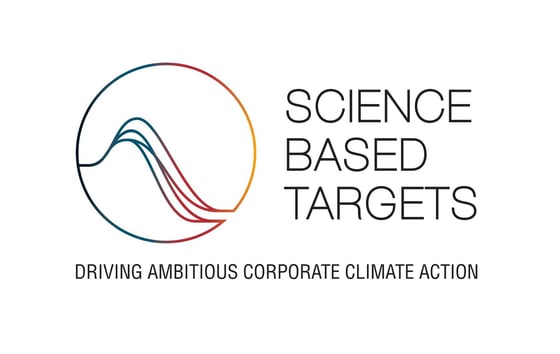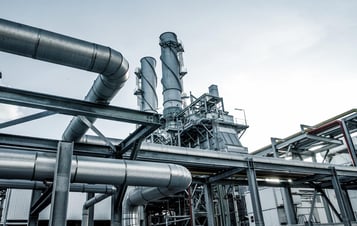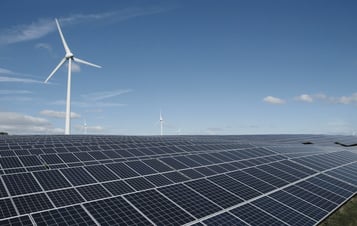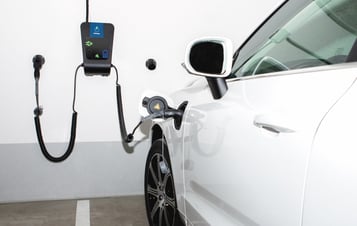Scope 1/2 Own operations gCO2e/kWh
| 2017 | 110 |
| 2030 | 25.3 |
| 2040 | 9.1 |
Direct emissions from assets Vattenfall owns or operates, such as power plants and vehicles, and indirect emissions from purchased energy that Vattenfall uses in own operations.
The targets on our road to net-zero are guided by climate science.
Through the 2015 Paris Agreement, governments across the world committed to limiting global temperature rise to well-below 2°C above pre-industrial levels and pursuing efforts to limit warming to 1.5°C. In 2018, the Intergovernmental Panel on Climate Change (IPCC) subsequently warned that global warming must not exceed 1.5°C above pre-industrial temperatures to avoid the catastrophic impacts of climate change.
At Vattenfall, we are committed to this global effort, working towards a future where we limit global warming and enable a fossil-free society.
Vattenfall is committed to working towards net-zero by 2040, which means at least a 90% reduction in absolute emissions across all emission scopes. Any residual emissions will be neutralised by permanently removing CO2 from the atmosphere.

The targets on Vattenfall’s road to net-zero are guided by climate science. The overarching net-zero target, and the specific targets which sufficiently cover all emission scopes, have been approved by the Science Based Targets initiative (SBTi). Our verified targets follow the methodology set out by SBTi. The targets are fully in line with a 1.5 C trajectory, as well as the EU aim to be climate neutral by 2050.
Vattenfall has set near-term (2030) and long-term (2040) targets across the different scopes all against a 2017 baseline. Vattenfall has set targets for:
In order to reach our 2040 net-zero commitment, Vattenfall must tackle emissions which arise across our whole value chain. Any remaining emissions need to be neutralised by negative emissions.
Negative emissions occur when CO2 is permanently removed from the atmosphere. This can occur in several ways, for example via nature-based solutions such as afforestation or re-forestation or increasing the carbon content of soil, or via technology based methods such as bio-energy carbon capture and storage, or direct-air carbon capture and storage.
Vattenfall will follow the requirements of the Science Based Targets initiative on negative emissions, ensuring that residual emissions are permanently removed.
Our targets per emission scope:
| 2017 | 110 |
| 2030 | 25.3 |
| 2040 | 9.1 |
Direct emissions from assets Vattenfall owns or operates, such as power plants and vehicles, and indirect emissions from purchased energy that Vattenfall uses in own operations.
| 2017 | 199 |
| 2030 | 43.6 |
| 2040 | 9.2 |
Emissions from generation of electricity that is purchased for resale to our customers.
| 2017 | 15.1 |
| 2030 | 6.9 |
| 2040 | 1.5 |
Emissions from use of sold fossil gas for heat and other uses by our customers.
| 2017 | 6.1 |
| 0 | |
| 2040 | 0.6 |
Emissions from the remaining value chain, such as extraction of fuels, transportation and emissions embodied in materials.
Overall net-zero target:
Vattenfall commits to reach net-zero greenhouse gas emissions across the value chain by 2040.
Near-term targets (2030):
Vattenfall commits to reduce scope 1 and 2 GHG emissions 77.0% per kWh by 2030 from a 2017 base year.* Vattenfall also commits to reduce scope 1 and 3 GHG emissions from all sold electricity 78.1% per kWh within the same timeframe.*
Vattenfall further commits to reduce absolute scope 3 GHG emissions from use of sold products for sold fossil fuels 54.6% within the same timeframe.
*The target boundary includes land-related emissions and removals from bioenergy feedstocks.
Long-term targets:
Vattenfall commits to reduce scope 1 and 2 GHG emissions 91.7% per kWh by 2040 from a 2017 base year.* Vattenfall also commits to reduce scope 1 and 3 GHG emissions from all sold electricity 95.4% per kWh within the same timeframe.*
Vattenfall further commits to reduce absolute scope 3 GHG emissions from use of sold products for sold fossil fuels 90.0% within the same timeframe. Vattenfall further commits to reduce all remaining absolute scope 3 GHG emissions 90.0% within the same timeframe.
*The target boundary includes land-related emissions and removals from bioenergy feedstocks.
Targets last updated on 10 December 2024.

SBTi is an independent global body established by organisations including the Carbon Disclosure Project (CDP), the United Nations Global Compact, and the World Wide Fund for Nature (WWF). It uses climate science to determine how much and how fast emissions need to be cut to in order to keep global temperatures below the thresholds at which tipping points may be breached.

We are forming partnerships in different fields and industries to reach climate goals.

Vattenfall is phasing out fossil production and investing in renewables.

We are committed to electrifying society as a way to help turn the tide on climate change.